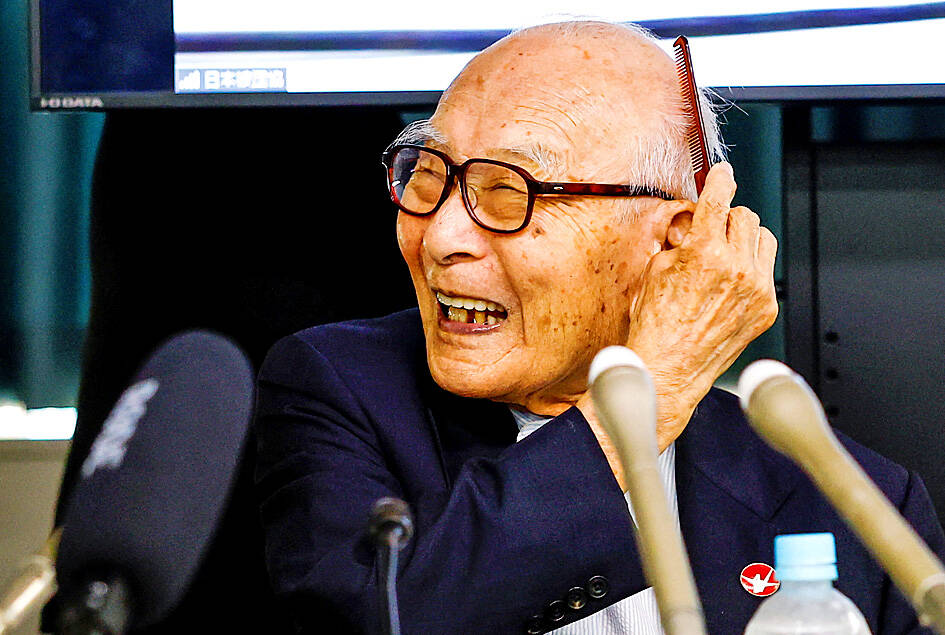The recipient of this year’s Nobel Peace Prize is a fast-dwindling group of atomic bomb survivors who are facing down the shrinking time they have left to convey the firsthand horror they witnessed 79 years ago.
Nihon Hidankyo, the Japanese organization of survivors of the US atomic bombings on Hiroshima and Nagasaki, was awarded for its decades-long activism against nuclear weapons. The survivors, known as hibakusha, see the prize and the international attention as their last chance to get their message out to younger generations.
“We must seriously think about the succession of our messages. We must thoroughly hand over from our generation to the future generations,” Hidankyo cochair Toshiyuki Mimaki told reporters on Friday night. “With the honor of the Nobel Peace Prize, we now have a responsibility to get our messages handed down not only in Japan, but also across the world.”

Photo: Reuters
The honor rewards members’ grassroots efforts to keep telling their stories — even though that involved recollecting horrendous ordeals during and after the bombings, and facing discrimination and worries about their health from the lasting radiation effects.
With their average age at 85.6, the hibakusha are increasingly frustrated that their fear of a growing nuclear threat and push to eliminate nuclear weapons are not fully understood by younger generations.
The number of prefectural hibakusha groups decreased from 47 to 36, and the Japanese government, under the US nuclear umbrella, has refused to sign the Treaty on the Prohibition of Nuclear Weapons.
However, a youth movement seems to be starting, the Nobel committee said.
Three high-school students accompanied Mimaki at the city hall, stood by him as the prize winner was announced, and promised to keep their activism alive.
“I had goose bumps when I heard the announcement,” a beaming Wakana Tsukuda said. “I have felt discouraged by negative views about nuclear disarmament, but the Nobel Peace Prize made me renew my commitment to work toward abolishing nuclear weapons.”
“I will keep up my effort so we can believe that nuclear disarmament is not a dream, but a reality,” high-school student Natsuki Kai added.
In Hiroshima, residents said they hope the world never forgets the atomic bombing of 1945 — now more than ever.
Susumu Ogawa, 84, was five when the bomb dropped by the US all but obliterated the Japanese city 79 years ago, and many of his family were among the 140,000 people killed.
“My mother, my aunt, my grandfather and my grandfather all died in the atomic bombing,” Ogawa said yesterday.
Ogawa said he recalls little, but the snippets he garnered later from his surviving relatives and others painted a hellish picture.
“All they could do was to evacuate and save their own lives, while they saw other people [perish] inside the inferno,” he said.
“All nuclear weapons in the world have to be abandoned,” he said. “We know the horror of nuclear weapons, because we know what happened in Hiroshima.”
Additional reporting by AFP

Kehinde Sanni spends his days smoothing out dents and repainting scratched bumpers in a modest autobody shop in Lagos. He has never left Nigeria, yet he speaks glowingly of Burkina Faso military leader Ibrahim Traore. “Nigeria needs someone like Ibrahim Traore of Burkina Faso. He is doing well for his country,” Sanni said. His admiration is shaped by a steady stream of viral videos, memes and social media posts — many misleading or outright false — portraying Traore as a fearless reformer who defied Western powers and reclaimed his country’s dignity. The Burkinabe strongman swept into power following a coup in September 2022

‘FRAGMENTING’: British politics have for a long time been dominated by the Labor Party and the Tories, but polls suggest that Reform now poses a significant challenge Hard-right upstarts Reform UK snatched a parliamentary seat from British Prime Minister Keir Starmer’s Labor Party yesterday in local elections that dealt a blow to the UK’s two establishment parties. Reform, led by anti-immigrant firebrand Nigel Farage, won the by-election in Runcorn and Helsby in northwest England by just six votes, as it picked up gains in other localities, including one mayoralty. The group’s strong showing continues momentum it built up at last year’s general election and appears to confirm a trend that the UK is entering an era of multi-party politics. “For the movement, for the party it’s a very, very big

ENTERTAINMENT: Rio officials have a history of organizing massive concerts on Copacabana Beach, with Madonna’s show drawing about 1.6 million fans last year Lady Gaga on Saturday night gave a free concert in front of 2 million fans who poured onto Copacabana Beach in Rio de Janeiro for the biggest show of her career. “Tonight, we’re making history... Thank you for making history with me,” Lady Gaga told a screaming crowd. The Mother Monster, as she is known, started the show at about 10:10pm local time with her 2011 song Bloody Mary. Cries of joy rose from the tightly packed fans who sang and danced shoulder-to-shoulder on the vast stretch of sand. Concert organizers said 2.1 million people attended the show. Lady Gaga

SUPPORT: The Australian prime minister promised to back Kyiv against Russia’s invasion, saying: ‘That’s my government’s position. It was yesterday. It still is’ Left-leaning Australian Prime Minister Anthony Albanese yesterday basked in his landslide election win, promising a “disciplined, orderly” government to confront cost-of-living pain and tariff turmoil. People clapped as the 62-year-old and his fiancee, Jodie Haydon, who visited his old inner Sydney haunt, Cafe Italia, surrounded by a crowd of jostling photographers and journalists. Albanese’s Labor Party is on course to win at least 83 seats in the 150-member parliament, partial results showed. Opposition leader Peter Dutton’s conservative Liberal-National coalition had just 38 seats, and other parties 12. Another 17 seats were still in doubt. “We will be a disciplined, orderly